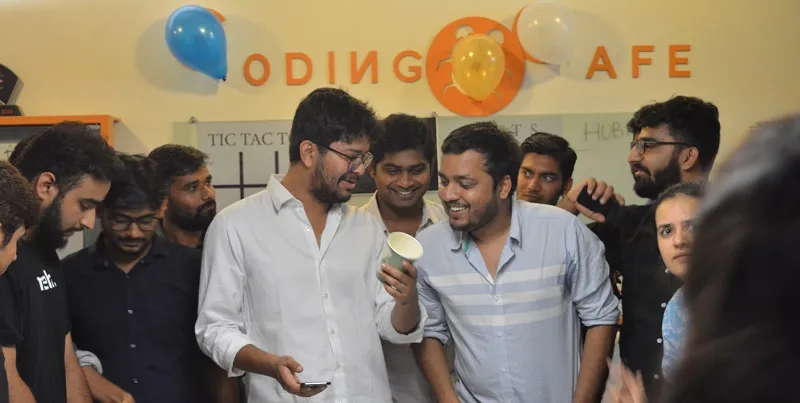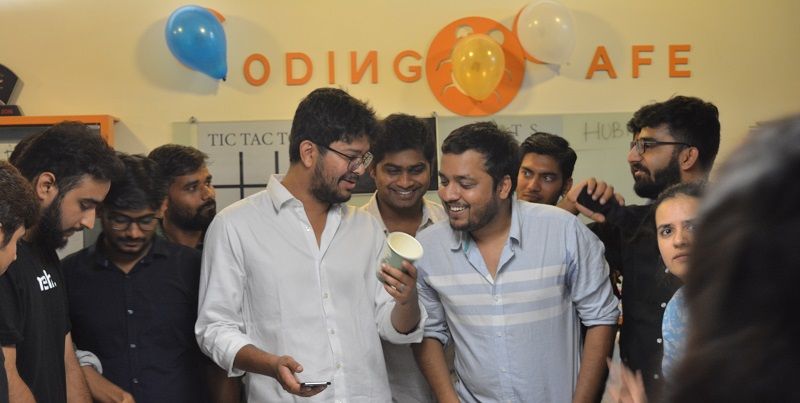From a pay cheque of Rs 16,000 to Rs 8 crore in revenue: here’s how Hubilo did it in 4 years
Mayank Agarwal and Vaibhav Jain founded Hubilo, a cloud-based, end-to-end event management platform now used by Niti Aayog, DSCI, Bill & Melinda Gates Foundation, Coca-Cola, Mercedes, and others.
Growing leads, building brand affinity, or growing business relationships – whatever a company’s reasons may be, events can help do it all. But Ahmedabad-based Hubilo knows organising them isn’t easy, and aims to take the problem out of event management. The cloud-based event management platform, launched in 2014, functions as a one-stop solution for every kind of event, by automating the entire process. From registrations and ticketing to networking and promotions, Hubilo's online event management suite helps businesses create memorable events.
Founded by Vaibhav Jain and Mayank Agarwal, the company started off with a pay cheque of Rs 16,000; today, Hubilo has Rs 8 crore in turnover.
According to Forrester Research, CMOs of B2B companies spend 24 percent of their marketing budget on live events. Clearly, CMOs believe in its ROI, but event ROI can only be properly calculated with proper event budgeting. Businesses, which have marketing clouds and sales clouds, continue to plan their events in a disjointed and traditional fashion. Most events do not use technology, except for ticketing and guest registrations. The problem begins with the hundreds of vendors and sponsors, and the ensuing coordination.

So how did it all begin for Hubilo? Vaibhav and Mayank met each other while they were studying engineering in Ahmedabad between 2009 and 2013. Both had complementary skills - Vaibhav had a mind for business; Mayank was a computer geek. They had a fondness for football and poker, and both were clear that they wanted to be entrepreneurs.
The idea came to Vaibhav when he was at an event where he accidentally met a college senior who had started his own venture. He soon realised that events were not at all digitised in India. His venture initially started off as a platform for college festivals in 2014. During the initial phase, he – the only founder - made plenty of mistakes. One of them was outsourcing technology, where he burnt a lot of money. That’s when he met Mayank and asked him to come in as co-founder. The duo started at iCreate, an incubation centre, in 2015, and began turning things around.
Mayank built an in-house tech team with a focus to build a suitable product for the new target market - corporate events. The co-founders invested Rs 20 lakh, and Hubilo was revamped as an all-in-one event tech platform that enables automation of multiple digital aspects of an event.
Hubilo says their technology can increase attendance, decrease booking costs, and lead to a rise in response time to requests for proposals (RFPs).
“This impact is quite significant when it comes to quantitative measures. Talking about event technology, currently a range of event technology tools is being used to optimise the overall event planning and execution process. There are multiple companies offering a range of different tools. There is engagement technology such as AV and VR, or Goquii for wearable technology,” Vaibhav says.
These tools help in maximising engagement at events. In terms of B2C, Hubilo helps in making an event more engaging and fruitful for attendees. When it comes to B2B benefits - where Hubilo mainly operates – the event technology tools help planners create a platform for their events and better them.
The business
“Our product is entirely automated event management software that helps planners in performing multiple event-planning tasks from a single platform or dashboard,” Vaibhav says.
Hubilo’s all-in-one event management software helps build a range of products for a company, including an event website, app, networking, registrations and ticketing, on-site check-in, and event marketing. Once a client logs in from their account, they need to enter a few basic details of their event and select products they would like to opt for. Each product offers a range of features.
So, if a client wants an event website, s/he can select it while on-boarding. The dashboard provides features such as event details, speakers, and sponsors. Once set up, clients can customise their event website as they like; once complete, they hit publish and the website or app goes live.
“We have similar set ups for the rest of our products where clients are simply required to fill in details and configure a few simple settings, followed by a quick publishing process,” Vaibhav says.
Incidentally, their first client was iCreate, and the duo facilitated event tech for iCreate’s Whatnext 2015. “It was one of the most exciting events for us and a moment to prove ourselves as iCreate was our incubator,” Vaibhav says. “We did their best and earned our first pay cheque of Rs 16,000 from the event.”
Hubilo has come a long way since then. The company now has over 150 clients and a diverse client portfolio that includes major government organisations, event management companies, corporate event planners, associations, and individual third-party event organizers. Notable clients include Niti Aayog, DSCI, US Government, Bill & Melinda Gates Foundation, Bajaj, IIFL Wealth, Coca-Cola, Asian Paints, Mercedes, Zak, HSBC, Andhra Pradesh Government, WizCraft, India Attitude, UBM, 70 EMG, Encompass, Geometry Global, multiple TiE Chapters across the country, and central and state government departments.
The way ahead
Hubilo follows two revenue models - a subscription model and an a-la-carte model. For the subscription model, the company decides pricing based on client requirements and number of events organised within a year. In the a-la-carte case, revenue is based on individual products that the client would like to opt for and customisations required.
The founders claim their revenue for FY2017 is Rs 8 crore.
According to Meetings and Conventions, events generated close to $845 billion in collections in 2017, in the US alone. Eventerprise, Zenus Biometrics, NVolv, Collaboration.AI, Eventfarm, and SocialTables are event tech companies that serve the North American market. There is no competition in India, and Hubilo competes with smaller firms offering event services.
Hubilo, which was also invited by TiE-Mumbai as a startup that could raise money globally in October 2018, was recently pitching for funds to global investors in the Seattle and San Francisco regions.
In the next 18 months, the co-founders aim to expand their products and services to the global market while simultaneously optimising their product itself, making it “bigger and better”.
“We aim to target major international regions, including Singapore, Malaysia, Dubai, and the US. We are currently in the process of expanding our sales team. As we grow, we will hire multiple personnel, including sales and customer service managers, to coordinate with and manage our international clients,” Vaibhav says.
An all-new event planning suite is also in the pipeline. This software will help event professionals accomplish multiple event planning tasks such as bringing sponsors and exhibitors on board, event budgeting, venue planning and management while collaborating with team members.
Raju Indukuri, Co-founder of FalconX, says: “These companies have to come to markets like the US where the market for events is bigger and the pay cheques are larger. That said, events tech can be a global product.”






